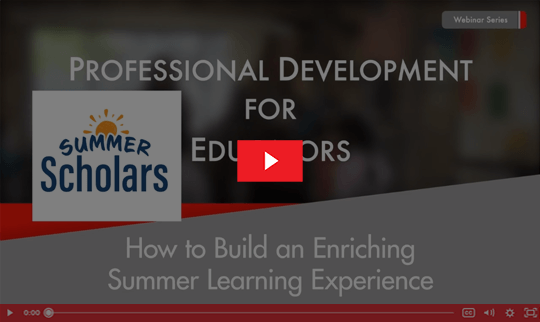4 Best Practices in Literacy Instruction for Summer School
In this article, you’ll learn how to apply best practices in literacy instruction to your summer school literacy programming. Utilize summer school to its full potential to make learning effective and fun for summer scholars. Download a free Reader’s Theater activity to share with summer students and access a webinar to learn more about how to build an enriching summer learning experience.
The Challenges of Engaging, Effective Summer School Literacy Instruction
Early in my teaching career, I agreed to teach summer school for reading intervention. It was 12 days of classes and three hours a day of instruction. How hard could it be?
Hard. Very hard. Maybe the most challenging 12 days of my education career up to that point. The days were long. The students were listless, and I was unsure that I was helping at all.
Several years later, I was helping teachers with the curriculum for those same summer school days. I tried to create a variety of rich opportunities to keep the day running smoothly. How hard could it be?
Hard. Very hard. I knew from the data which skills students needed, but there was so much content needed to fill three-hour school days. I needed fresh new texts and strategies to keep students engaged. I needed students (and teachers!) to keep coming back after the first day.
Why Summer Learning?
Summer is a unique window for learning. A summer school program can be structured to accomplish multiple goals: to close gaps, to prevent slides, and to prepare students for the next year. The longer days, the smaller classes, and the freedom of summer school can be the perfect opportunity for beneficial learning activities.
While summer school has been a part of the education landscape for years, since the pandemic learning interruptions of 2020 and 2021, summer learning has never been more significant. Students continue to need both literacy and mathematics support. Research shows that students benefit from summer programs, especially those from low-income backgrounds.
Use Best Practices
As campuses and districts think about their summer learning options, best practices must be considered when designing a literacy-focused summer school program. Best practices are instructional strategies and instructional approaches that will improve children’s reading. Directors should consider materials, collaboration and engagement opportunities, and knowledge-building texts and materials for summer literacy instruction that are both effective and fun for students and teachers.
Best Practice in Literacy Instruction #1: Use the right materials.
One trap of summer school literacy lessons is making the texts easier. According to a 2018 study of hundreds of classrooms around the country, giving students opportunities to learn with rich, challenging, grade-appropriate texts showed better gains than only working with texts at the student's reading level. In fact, In classrooms where students had greater access to grade-appropriate assignments, they gained nearly two months of additional learning compared to their peers.
The best texts to use are short and challenging. But teaching that challenging text is never easy and should be supported by the teacher. Tim Shanahan says, "teaching with more complex text aims to expand the role of teaching in order to maximize the amount of student learning."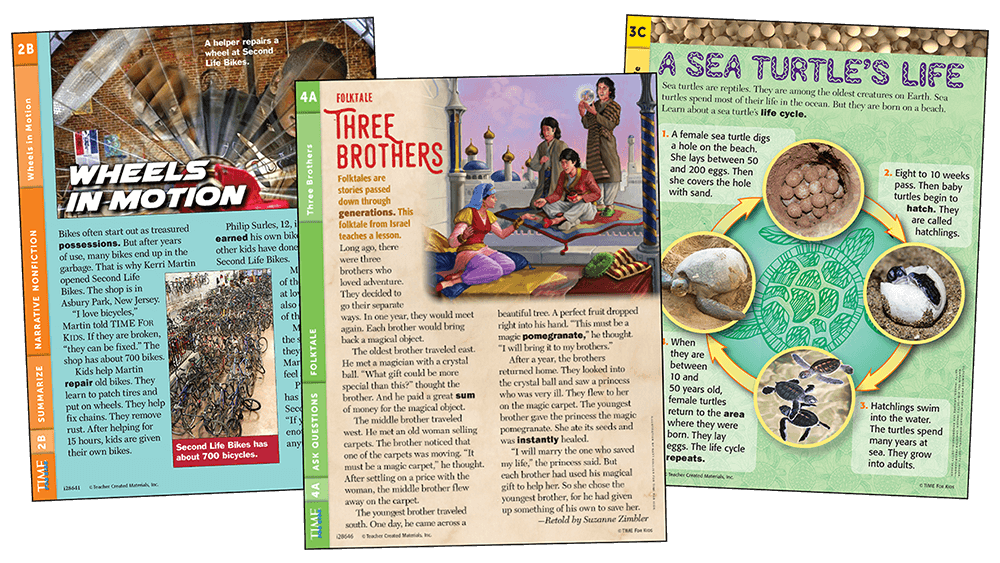
Many students would struggle to read a complex text independently on the first reading. That's why using a short text works especially well for summer school. A short text allows for multiple readings, and we know that rereading is valuable for students’ reading development.
Starting with read-alouds, students can then re-enter the text to untangle sentences, with teacher support. Students have less content to grapple with in a short text, so finding text evidence is easier.
Using a short, challenging, grade-level text for students will make summer literary programs rigorous, but worthwhile. Students need practice and strategies for grappling with a challenging text. The small classes and extended time of summer school is a great place for this work. 
Best Practice in Literacy Instruction #2: Make learning collaborative and engaging.
We want summer scholars to keep coming back! According to comprehensive research on summer learning by the RAND Institute "attendance is key" for summer learning to have an impact into the next school year (2022). But how do we make summer school appealing?
For summer literacy instruction to be fun, it has to be both collaborative and engaging. The same study points to programs that "had an inclusive and friendly environment, strong engagement, and positive interactions between adults and students."
One popular model is to structure summer school days with a balance of key academic content and enrichment opportunities. Summer programming can provide the perfect place for students to engage in real-world problem-solving. The extended days and smaller classes of summer are perfect for rich learning that doesn't always have a place during the school year.
While we may be working with reading and math in the morning, the afternoon gives students a chance to try new and engaging activities. Working in pairs or teams on larger projects gives students vital practice with collaboration skills.
Ideas for collaborative and engaging learning:
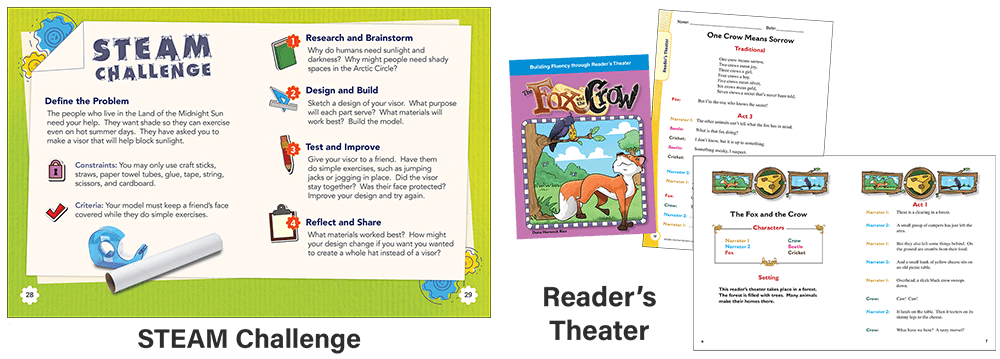
- Reader's Theatre Performances
- STEAM Challenges
- Problem- or Project-Based Learning
- Field Trips
- Shark Tank-Style Innovation Challenges
In addition to developing content-area skills like reading, writing, speaking, and fluency, engaging programming gives students real reasons to collaborate. Students practice creativity, critical-thinking, and compromise. These "soft skills" are some of the most missed areas of development.
Best Practice for Literacy Instruction #3: Build background knowledge and experiences to take students into the next school year.
Research shows that background knowledge impacts reading comprehension. Summer school is an exciting opportunity to build students' knowledge with texts and experiences. Read-alouds of rich texts can help students build background knowledge on a variety of topics. ILA's 2018 Leadership Brief calls the read-aloud "one of the most important instructional activities" to help develop skills and knowledge.
But not all background knowledge can come from texts. Collaborative and engaging experiences in summer programs can also help students develop background knowledge in a range of areas. Imagine all the new things students can learn when they put on a production of a reader's theater script for their peers or they work as a team to build a bridge out of recycled materials.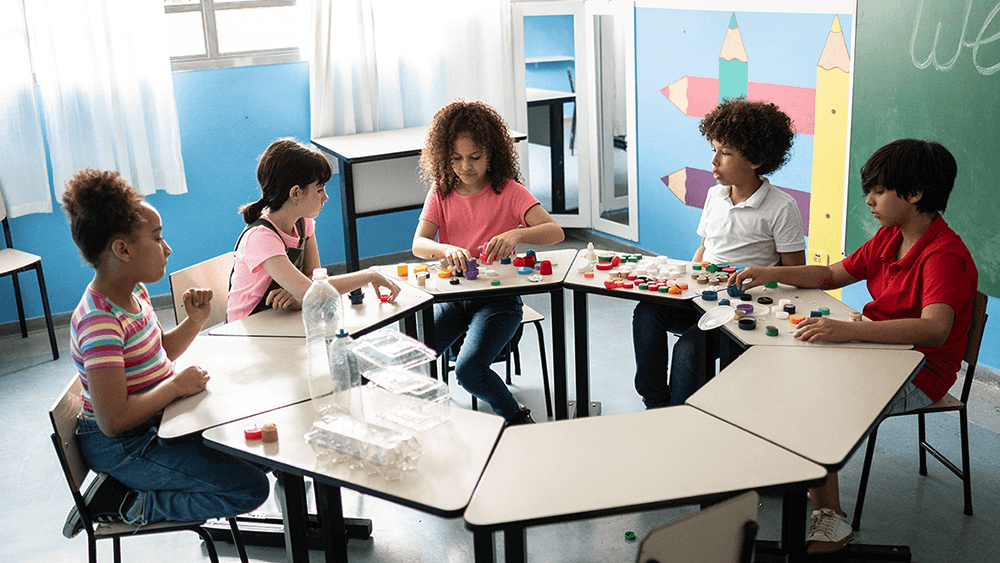
Best Practice #4: Consider the pace.
Summer school is unique and requires different pacing than instruction during the school year. You’ll want to select a program and resources that suit your summer learning goals and that is easy for your summer staff to implement.
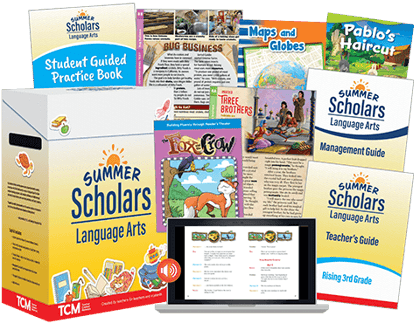 TCM's summer learning solution, Summer Scholars for Language Arts, is a ready-to-use solution, with short, challenging texts to support reading comprehension, explicit phonics lessons, and reader's theater scripts for engaging and collaborative learning that builds fluency. Everything is laid out in a simple, easy, teacher's guide with clear pacing, specifically designed for the unique learning environment of summer school. Its sister series, Summer Scholars for Mathematics, includes math lessons, real-world problem-solving, mathematical discourse tasks, and hands-on STEAM challenges to keep learning fun!
TCM's summer learning solution, Summer Scholars for Language Arts, is a ready-to-use solution, with short, challenging texts to support reading comprehension, explicit phonics lessons, and reader's theater scripts for engaging and collaborative learning that builds fluency. Everything is laid out in a simple, easy, teacher's guide with clear pacing, specifically designed for the unique learning environment of summer school. Its sister series, Summer Scholars for Mathematics, includes math lessons, real-world problem-solving, mathematical discourse tasks, and hands-on STEAM challenges to keep learning fun!
A summer school environment can be the ideal opportunity for beneficial learning activities. Building rich background knowledge and experience will support students in all content areas, including reading. Real-world learning experiences and collaboration can bring new experiences and topics to students and build academic vocabulary. And providing opportunities for students to strategically build knowledge through carefully selected texts and activities will aid in student learning.
Jump, J., & Kopp, K. (2023). What the science of reading says about reading comprehension and content knowledge. Shell Education.
Shanahan, T. (2020). Teaching with Complex Text: Haven’t You Ever Heard of the ZPD? Reading Rockets. https://www.readingrockets.org/blogs/shanahan-on-literacy/teaching-complex-text-havent-you-ever-heard-zpd
TNTP. (2018). The Opportunity Myth: What Students Can Show Us About How School Is Letting Them Down—and How to Fix It. https://tntp.org/assets/documents/TNTP_The-Opportunity-Myth_Web.pdf
Author Bio:
View All AuthorsKim Carlton, Academic Officer for Teacher Created Materials
Kim Carlton currently serves as an Academic Officer for Teacher Created Materials, where she works with teachers in a variety of areas, including balanced literacy and writing instruction to foster her passion for helping teachers infuse reading and writing instruction into their daily teaching. Ms. Carlton is a Gold-Level Abydos Writing Project Trainer, where she has conducted 15 summer writing institutes for teachers, and holds exclusive memberships with the Association of Texas Professional...
Join the TCM Blog Community
Subscribe by sharing your email address and we will share new posts, helpful resources and special offers on the issues and topics that matter to you and the children and teens you support.

